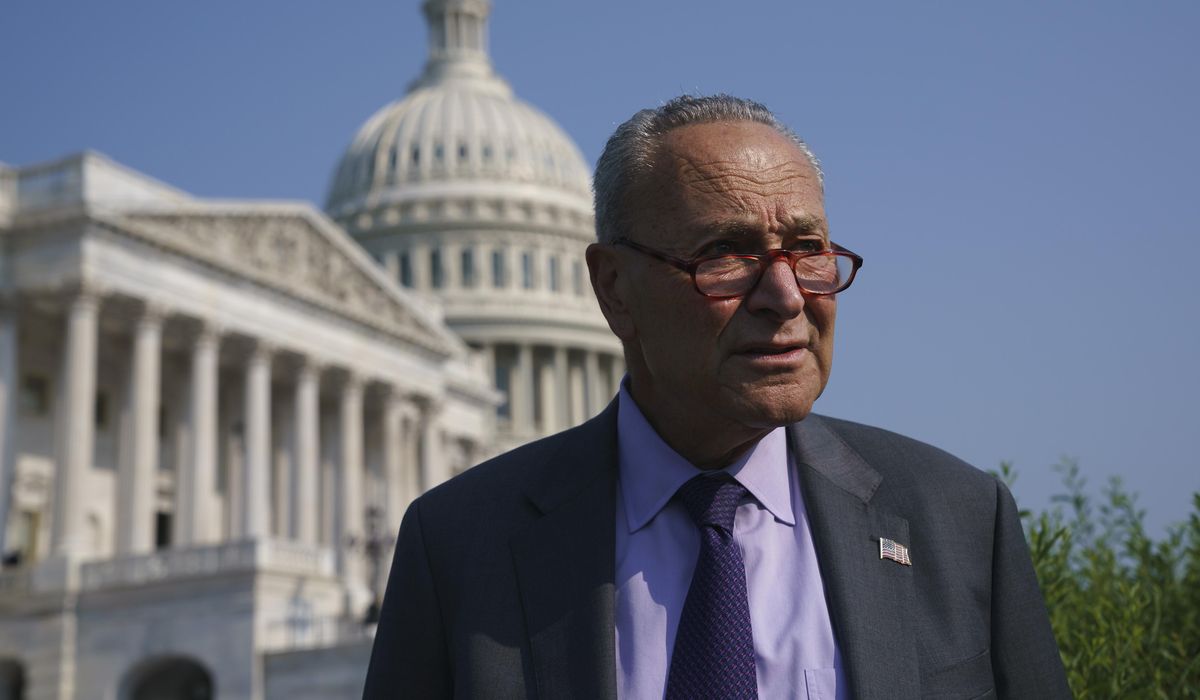
Senate Majority Leader Charles E. Schumer is rushing to ram a bipartisan $1.2 trillion infrastructure package through the Senate before lawmakers depart for August recess, speeding up the process after Republicans helped break down the filibuster barrier.
Mr. Schumer, New York Democrat, said lawmakers should be prepared to remain in Washington over the weekend to work on the bill before leaving for a monthlong summer vacation set to start Monday.
“It’s been my goal to pass both the bipartisan infrastructure bill and a budget resolution during this work period,” he said. “Some pundits have called that a tall order. I understand that.”
Senate Minority Leader Mitch McConnell, Kentucky Republican, is pushing to give senators adequate time to review the package and offer amendments.
Democrats can rush forward now since the legislation, which is currently only a framework, on Wednesday cleared the 60-vote threshold to survive in the chamber. The infrastructure deal advance with 17 Republicans joining all 50 Democrats.
The vote was a major victory for President Biden, who ran on his ability to work across the aisle and now is poised to deliver $1.2 trillion of infrastructure projects.
Former President Donald Trump’s attempt to get an infrastructure deal never got off the ground with Senate Democrats.
“We showed all of those people who said: ‘Congress is broken, the process does not work. You cannot bridge the partisan divide,’” said Sen. Jeanne Shaheen, a New Hampshire Democrat who helped negotiate the bipartisan deal. “That, in fact, we can get something done.”
Mr. Schumer’s need for speed is spurred by the calendar. Without making significant progress on the deal in the next two weeks, Mr. Schumer must choose between canceling part of the summer recess or delaying the debate until Congress returns in September.
The latter is problematic because when lawmakers return, they must pass annual spending bills to keep the government open past a Sept. 30 deadline.
Complicating matters is that Democratic leaders have tied the infrastructure package to a $3.5 trillion social welfare bill.
The bigger legislation, which is packed with liberal priorities, is set to pass without Republican votes in a process known as budget reconciliation. It allows some spending and tax measures to avoid the 60-vote threshold needed to get past a filibuster and pass with 51 votes. To succeed, Mr. Schumer needs all 50 Senate Democrats unified and Vice President Kamala Harris to cast the tie-breaking vote.
House Speaker Nancy Pelosi, California Democrat, has pledged not to move the bipartisan infrastructure deal before reconciliation.
Republican support during the crucial test vote Wednesday was made possible because the infrastructure is limited in size and scope.
The total deal is set to spend $1.2 trillion over the next decade, with roughly $550 billion coming from new revenue.
The package includes provisions that both Democrats and Republicans demanded, including money for Amtrak, highway construction, airport upgrades and expanding broadband internet service.
As written, the infrastructure package also has significant climate change provisions. The inclusions were made to pacify far-left Democrats, who threatened to pull support from the deal otherwise. For instance, the bill proposes to spend:
• $73 billion to remove fossil fuels, like coal and natural gas, from the electrical grid.
• $7.5 billion to install electric vehicle charging stations across the country. At least $5 million is also earmarked for education districts to transition to electric school buses.
• $21 billion for removing pollution from soil and groundwater. Money is also to be allocated to focus on environmental justice.
Also included are new regulations by Sen. John Hickenlooper, Colorado Democrat, requiring states to review utility rates for electric vehicle charging stations.
To pay for all of the new spending, the deal’s authors have proposed an intricate series of budgetary changes. Most are meant to boost federal revenue, without raising taxes — a key metric for GOP support. As such, the package proposes to:
• Repurpose more than $205 billion of unused coronavirus relief funds. A further $53 billion will come from unused unemployment benefits that states have refused to accept in the face of tight labor markets.
• Raise $50 billion by delaying a Trump-era rule on Medicare rebates.
• Garner $87 billion from the sales of space on the wireless radio wave spectrum.
• Raise $30 billion by applying fees and information-reporting requirements on cryptocurrency.
• Garner $87 billion from the sales of space on the wireless radio wave spectrum.
Lawmakers also state that at least $60 billion of new revenue will be generated by the economic growth that accompanies the new infrastructure projects.
It is unclear if all of the proposed revenue streams will prove effective. The full language of the bill has yet to be written, limiting the ability of the Congressional Budget Office to fully determine the cost.





